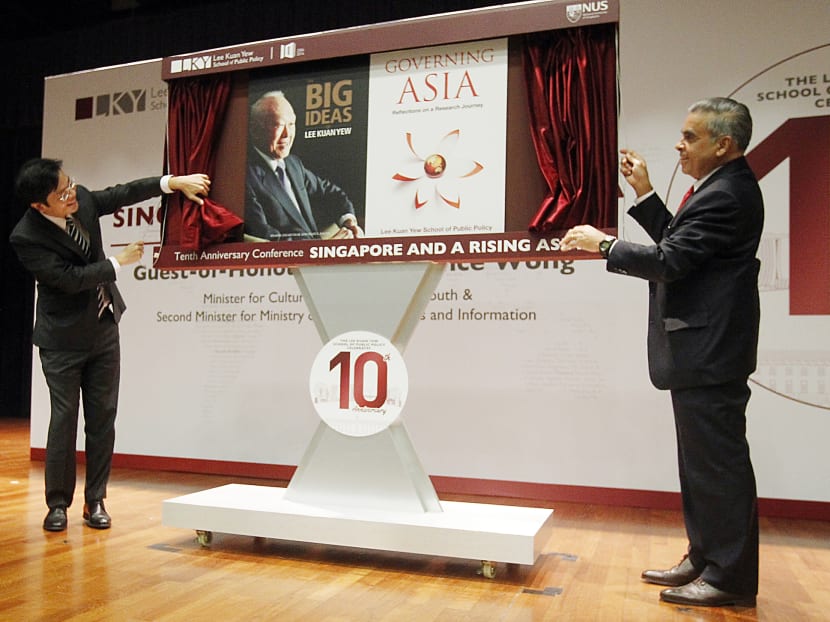How to spend revenue fairly ‘the real issue for today’s Govt’

Mr Lawrence Wong and Professor Kishore Mahbubani, Dean of the Lee Kuan Yew School of Public Policy, launching the two new books on public policy at the school’s 10th-anniversary conference yesterday.
Photo: Ernest Chua
SINGAPORE — While the Republic’s first Prime Minister, Mr Lee Kuan Yew, was “against welfarism as a blunt instrument of redistributing wealth, and rightly so” — as Mr Lawrence Wong, Minister for Culture, Community and Youth, put it — the Government of today is increasing social spending and strengthening safety nets.
“So, it’s no longer an issue of whether the Government should or shouldn’t spend more. We will be doing more,” said Mr Wong yesterday, pointing out that the Government in the early years had to prioritise spending on areas such as public housing.
He was speaking at the launch of two new books on public policy — The Big Ideas of Mr Lee Kuan Yew and Governing Asia: Reflections on a Research Journey of the Lee Kuan Yew School of Public Policy — which was held as part of the school’s 10th-anniversary conference.
In his speech, Mr Wong touched on the topic of welfarism and social spending, while talking about one of Mr Lee’s “big ideas” — sustainable development. He reiterated that Singapore had been founded on “democratic socialist ideals”. “As Mr Lee acknowledged in his characteristically frank manner to a 1972 gathering of socialist parties in Asia, ‘socialism’ is an elastic word,” he said.
Mr Wong added that while Mr Lee was averse to welfarism, the former Minister Mentor recognised and believed in the necessity of a society in which, regardless of wealth and status, everyone has an equal opportunity to make the best of his potential.
The minister said the real issue for today’s Government “is how best to spend the revenue that we get from taxes in a fair and sustained manner”.
“In that sense, it’s not so useful to think of the Government as a separate entity from the people, with its own source of funds, as we sometimes tend to do,” he said.
“Rather, government is about the things we decide to do together as a people. Through fiscal policy, we contribute money to a central pot through taxes and spend that money to give expression to the shared values we wish to promote as a society.”
During the question-and-answer session, Mr Wong said Singapore had not blindly adopted a “liberal free- market model” from the start. “We also had no money at that time in Singapore (in) 1965. We identified where the crucial needs were. We made priorities because of the lack of resources at that time and applied the resources that we had to the areas where we felt were of greatest concern and of high priority for Singaporeans.”
Mr Wong was also asked about the dominance of social media in public discourse — for example, how Scotland’s recent referendum on independence did not turn out to be as close as social media framed it to be.
In response, Mr Wong noted the importance of having a discourse “that doesn’t veer towards misconception, untruths (and) half-truths”.
However, this is not something the Government can address on its own. “The Government can take some steps, but society today is much more complex than just … the Government acting as the proverbial referee,” he said.
Referring to examples such as last month’s incident at Hong Lim Park, where protestors disrupted a charity carnival, Mr Wong said people speak out from time to time when certain norms have been infringed upon and this is something to be encouraged for a richer public discourse.






